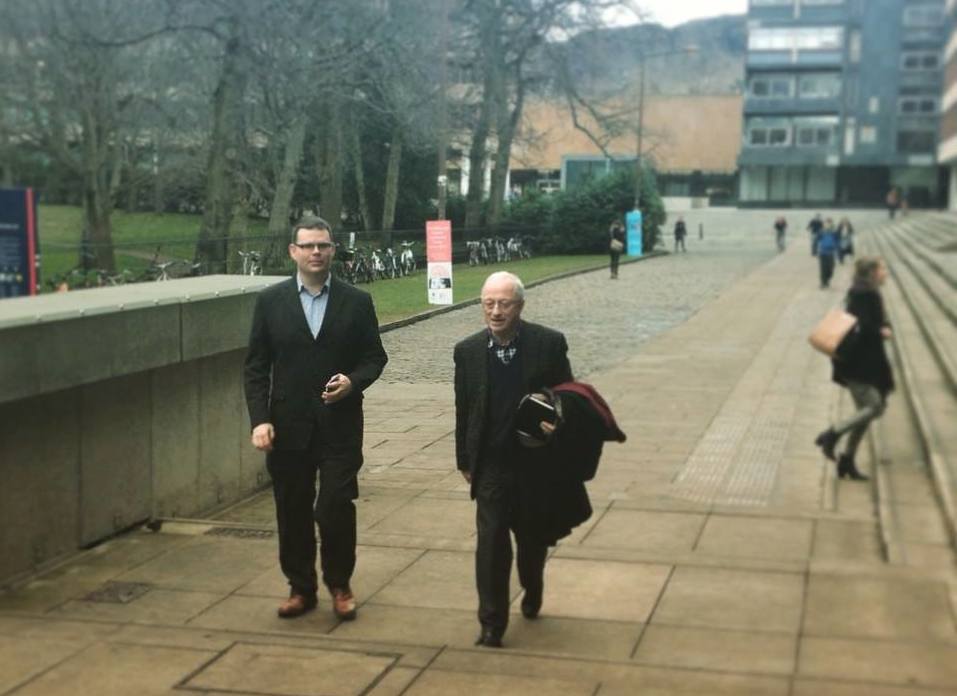As online voting enters its second and final day, campaigns for both rectorial candidates are racing to rally support and secure last-minute votes.
Candidates are dropping into lectures to make final appeals. Supporters are handing out flyers and speaking to students departing from the Main Library. Posters depicting the two candidates—incumbent Peter McColl and challenger Steve Morrison—feature prominently across campus.
Yet as the candidates and their campaign teams vie to win favour for their respective policies, an obstacle stands in the way of both sides: awareness. Many students have never heard of the position and are oblivious of the contestants running for it, operatives on both teams have said.
Speaking to The Student, McColl campaign manager Harriet Protheroe-Davis explained: “Sadly not many people know that there even is an election happening. So the first hurdle is to let people know that there is an election.”
Morrison campaigner Naomi Jefferson provided a similar critique: “Our main focus right now is getting out the vote using our grassroots team.”
As the campaign teams seek to maximise exposure of both their candidates and the election itself, distinct approaches have emerged.
Morrison’s campaign has employed heavy use of social media to expand outreach. Throughout the last week, the team has been prolific with campaign slogans, Facebook videos and Twitter posts. On Monday, an online question and answer session was established allowing direct access online to the candidate.
“The main thing has been focusing on social media and combining that with talking to people,” Morrison campaign manager Jonny Ross-Tatam told The Student.
“Social media has been huge,” Jefferson agreed.
“We’ve had a lot of people outside of the campaign team change their profile pictures and even ask to help our efforts,” she added.
But McColl operatives insist that social media is but one element to the campaign strategy and that its impact has been overvalued.
McColl campaigner Matija Tomanović told The Student: “I think the personal interaction is much more important.”
Tomanović argued that the election would ultimately be won with lecture shout-outs, campus campaigning and interactions with students and staff—“not through posters and social media posts.”
Asked about his tactical preferences, Peter McColl told The Student: “Social media can, all too often, involve talking to the same groups of staff and students.

“I’ve put a real focus on speaking to students in lectures and around the University.”
By many metrics, the Morrison campaign’s technological emphasis is delivering results. A statistical analysis by The Student of the Twitter response during last week’s debate indicated a heavy preference for Steve Morrison’s positions online. Around 190 Facebook users have registered as attending Morrison’s voting event, compared to about 160 for the equivalent McColl event. A separate Morrison campaign page has accrued over 230 likes.
The McColl team acknowledged the advantage of their competitor’s online operations. But they dismissed its relevance campus-wide.
“The social media presence of Steve is high, yes,” Protheroe-Davis told The Student.
“But I wonder how much of it is coming from those who are already in the student politics bubble.”
Instead, McColl supporters claim a distinct advantage of their own: staff support. Morrison’s ambitious programme to transform the teaching structure at university is alienating many staff members who feel their teaching methods are being unfairly attacked, Protheroe-Davis claimed.
With his appeal to external parliamentary methods to effect his proposals, McColl offers staff a more palatable and less combative approach that could influence votes, Protheroe-Davis argued.
The extent to which such sentiment exists among the staff body could not be verified. But when asked to respond, Morrison rejected the suggestion.
He told The Student: “I have engaged with many members of Staff from heads of school to staff representatives on the court, to non-academic members of staff. All of them have been very encouraging to the ideas that I have expressed to them.”
He added: “I believe I am pushing on an open door with my ideas around the modernisation of education.”
Though divergent in their approaches, the candidates face one obstacle equally: student awareness. A vast majority of students interviewed at random by The Student were unfamiliar with the role of rector or the candidates’ platforms. Those that were familiar had often only heard of the position for the first time in a lecture shoutout from one of the campaign teams.
“I’m voting Steve McColl,” one student who declined to give her name told The Student.
“There was this guy I saw called Peter,” Scott Redmond recalled. “Wait—no! It was Steve.”
In what appeared to be a testament to stronger online presence, Morrison’s name was more prevalent among those interviewed who did remember the candidates’ names.
Less clear was whether that name recognition would translate to actual votes.
“I’ve been seeing a lot more of Steve on Facebook,” politics student Ally Hally told The Student echoing other experiences.
“But I haven’t at all decided myself,” she added.
Both candidates will continue their outreach efforts throughout the day until voting on MyEd closes at 7. The results will be announced in the Playfair Library in Old College.

